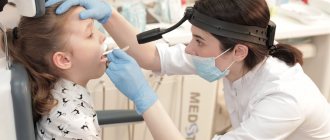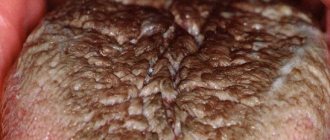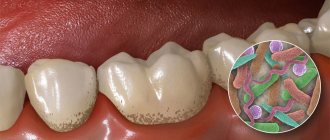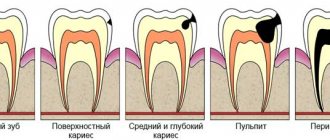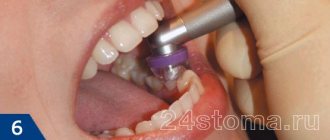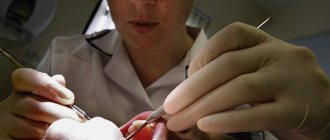In some cases, tonsils may become enlarged without fever. Enlarged tonsils without fever require the same attention and treatment approach to avoid the development of complications.
Author:
- Chuprikov Roman Sergeevich
ENT pathology expert
3.45 (Votes: 33)
Tonsils (tonsils) are an important organ of the human immune system, involved in protecting the body from harmful carriers and preventing their spread. Their main task is to identify pathogenic microorganisms and produce antibodies to fight them.
Enlarged tonsils themselves are not a disease, but a symptom. They can increase:
- with infection;
- with genetically determined hypertrophy;
- for blood diseases (lymphoproliferative diseases);
- for autoimmune diseases;
- for allergic inflammation and swelling.
Usually these processes are accompanied by an increase in temperature, but in some cases the tonsils can enlarge without an increase in temperature. This often forces one to delay a visit to the doctor, since temperature is considered a marker of the disease. But enlarged tonsils without fever require the same attention and treatment approach to avoid the development of complications.
Under what conditions can tonsils be enlarged without fever?
Without an increase in temperature, the tonsils can become inflamed due to:
- Allergies. Enlarged tonsils often occur in people prone to allergies. Allergens include various substances - animal hair, dust, pollen, food, insects, household chemicals.
- Fungal infection. The following symptoms are observed: sore throat, dry mouth, visible cheesy coating on the mucous membrane.
- Dry air. Due to constant inhalation of dry air, the mucous membrane of the larynx dries out, causing the tonsils to swell. Working in polluted conditions also leads to this.
- Smoking. Tobacco smoke burns the mucous membrane, which can result in swelling of the tonsils.
- Some forms of sore throat (tonsillitis). The biological meaning of an increase in temperature during infectious diseases is to accelerate the death of pathogenic carriers in an environment with high temperatures. Consequently, if the body temperature has not increased, it means that the number of infectious carriers that have entered the body is small. Usually, if the infection was minor, then the person easily and quickly suffers from this illness. But with enlarged tonsils and no temperature, we can talk about an untreated acute inflammatory process in the tissues of the tonsils and its transition to chronic. In this case, the recovery process will take longer, and in addition, there is a possibility of complications developing. Both variants of pathologies require examination and prescription of correct treatment by an otolaryngologist.
Hypertrophy of the palatine tonsils
Classification
There are three degrees of enlargement of the palatine tonsils:
- First degree - a third of the distance from the edge of the palatine arch to the uvula is blocked.
- Second degree - lymphoid tissue fills two-thirds of the space.
- Third degree - the tonsils “meet” at the uvula and touch each other.
According to the forms of the disease, they are distinguished:
- Hypertrophic form (physiological and age-related anomalies).
- Inflammatory form (bacterial infections).
- Hypertrophic-allergic form (accompanied by allergic symptoms).
Symptoms
The earliest manifestations of the disease are discomfort when swallowing and a feeling of a “lump in the throat.” Then there is difficulty in nasal breathing, sleep disturbance, snoring, whistling noise when breathing, coughing and mouth breathing.
With hypertrophy of the second and third degrees, the mobility of the soft palate decreases, articulation is impaired, nasal sound, slurred speech, and distortion of words appear. The patient constantly breathes through the mouth, since the choanae are blocked by the tonsils and swollen mucosa. Attacks of night apnea (stopping breathing during sleep) appear. Hearing progressively worsens.
Complications
All complications are associated with impaired patency of the Eustachian tubes and choanae. Violation of the outflow of secretions from the nose provokes the addition of a bacterial infection in the air cavities and middle ear.
Due to discomfort during swallowing, dysphagia appears, manifested by weight loss, vitamin deficiencies and gastrointestinal disorders. Due to chronic lack of oxygen, the nervous system suffers.
Diagnostics
The diagnosis is made by an otolaryngologist based on the following information:
- Complaints and anamnesis.
- Pharyngoscopy (size, color, nature of the surface and consistency of the tonsils).
- Clinical blood test (increased leukocytes, eosinophils, accelerated ESR).
- X-ray of the nasopharynx (degree of lumen overlap).
Differentiation is carried out with tonsillitis, lymphosarcoma, tonsillitis, intratonsilal abscess.
Treatment
Therapy depends on the degree of enlargement of the tonsils and is divided into several stages:
- Drug treatment: Treatment of mucous membranes with antiseptics
- Lymphotropic drugs.
- Ozone therapy
The prognosis for life and health is favorable. After the operation, recovery is rapid, breathing and speech return to normal. In children, first-degree hyperplasia may disappear on its own as the child grows. Specific prevention has not been developed.
Features of the condition with enlarged tonsils without fever
Even at normal body temperature, but in the presence of pathological processes in the body, a person may feel completely unwell. Inflammation of the tonsils without fever, regardless of the cause, can interfere with a normal lifestyle and be accompanied by:
- headache;
- sore throat;
- lack of appetite;
- difficulty swallowing;
- dryness and sore throat;
- enlarged lymph nodes and pain on palpation;
- fatigue, weakness, drowsiness, decreased performance, irritability.
Complications of tonsillitis
- Labored breathing.
- Sleep apnea (holding your breath during sleep).
- Spread of infection to the tissue near the tonsils (peritonsillitis), peritonsillar abscess - accumulation of pus behind the tonsil.
- Acute cervical lymphadenitis is inflammation of the cervical lymph nodes.
Streptococcal tonsillitis can cause complications such as:
- acute rheumatic fever, affecting the joints, heart and other organs;
- glomerulonephritis (inflammation of the kidneys, which can lead to serious consequences, including kidney failure).
Treatment with antibiotics significantly reduces the likelihood of complications after streptococcal sore throat.
Treatment of enlarged tonsils without fever
Before prescribing treatment, it is necessary to establish the cause of inflammation of the tonsils.
If the cause is an infectious or fungal infection, then the patient is prescribed a course of antibacterial therapy, treatment of the throat and mucous membranes with special preparations, infusions into the larynx, rinsing the tonsils, and taking vitamin complexes to support the immune system.
If conservative treatment is ineffective, a tonsillectomy may be prescribed - surgical removal of the tonsils. Most often, this is an indication for the treatment of chronic tonsillitis, which occurs with toxic-allergic manifestations and seriously interferes with a person’s comfortable life.
If swelling of the tonsils is associated with external factors - smoking, working in unsuitable conditions, attacks by allergens, the doctor will advise correction of lifestyle or environmental conditions, and taking supportive medications.
Treatment.
An effective treatment tactic will be chosen by an ENT doctor only after the cause of tonsil hypertrophy has been established.
Depending on the cause of inflammation, the patient is prescribed:
- antibacterial drugs if the causative agent of the disease is bacteria. Moreover, the medicine must be taken “from start to finish” - a strictly defined number of days, even if the child feels better. Continuous treatment is the key to a quick recovery without complications;
- antiviral drugs, if the causative agent of the disease is a viral infection;
- antifungal agents, if the cause of inflammation is fungi;
- gargling and irrigating the throat with antiseptics - constantly gargling is necessary to wash away pathogenic flora from the mucous membranes;
- antihistamines to relieve tissue swelling, and if the cause of throat discomfort is an allergic reaction;
- washing the lacunae of the palatine tonsils from pathogenic flora (it is optimal to start washing from 6-7 years of age);
- physiotherapeutic procedures (laser, ultrasound, photodynamic therapy, ultraviolet exposure, etc.)
Some parents believe that it is easier to remove the tonsils and get rid of the problems associated with them. But this is not a solution! Removal requires strict indications: more than four sore throats during the year, bad rheumatic tests, peritonsillar abscess and complications in the heart, kidneys and joints. If there are no indications, you need to be observed by an ENT doctor and, if necessary, carry out timely treatment.
Prevention
To prevent pathological enlargement of the tonsils, you must adhere to the following recommendations:
- Increase immunity: eat properly and well, exercise, exercise, give up bad habits, and maintain proper sleep patterns.
- Avoid provoking factors: do not overcool, humidify the air in the room, remove allergens from the environment.
- Treat infectious diseases promptly at the very beginning and prevent them from becoming chronic.
- Carry out preventive gargling and rinsing of tonsil lacunae. These procedures are carried out in our clinic, and our doctors will be happy to advise you about them.
If you are concerned about enlarged tonsils without fever, make an appointment with otolaryngologists at the Ear, Nose and Throat Clinic - you will receive comprehensive consultations and quality treatment.
The degree of enlargement of the tonsils.
There are four stages of enlargement of the tonsils. At the first stage, the tonsils occupy a third of the space between the pharynx and the palate. In this case they are said to be slightly enlarged. Symptoms of the disease do not manifest themselves in any way.
At the second stage, the tonsils already occupy half of the free space. There is discomfort when swallowing liquids, food and breathing. Tissue hypertrophy is average.
In the third stage, swallowing becomes very difficult as the lymphoid tissue increases to an impressive size.
The fourth stage is characterized by severe hypertrophy, when the tonsils completely block the pharynx. This condition interferes with proper breathing and nutrition.
If inflammation of the tonsils begins, without timely treatment, the stages quickly replace each other.
Advantages of visiting the Miracle Doctor clinic
When prescribing surgical intervention, along with traditional surgical methods for removing tonsils in children, the Miracle Doctor clinic performs tonsil removal under anesthesia using the cold plasma coblation method, in which a special device with an electrode is used instead of a scalpel. Removing tonsils with a coblator avoids damage to surrounding tissues; the operation is quick and almost bloodless.
Regardless of whether general or local anesthesia is used, highly effective and safe drugs of the latest generation are used. To ensure comfort during the postoperative period, the patient is provided with a separate room in a 24-hour hospital. Pediatric otolaryngologist surgeons at the Miracle Doctor clinic can not only slow down inflammation of the palatine tonsils, but also, in advanced cases, perform surgery using progressive minimally invasive methods.
Complications after a sore throat: where to expect a blow?
First of all, the ENT organs closest to the source of inflammation come under attack, especially vulnerable after suffering from a sore throat. Therefore, the recovery period, which takes place under the supervision of a specialist, will eliminate the development of a number of dangerous diseases:
- lymphadenitis (inflammation of the lymph nodes) can accompany any form of sore throat. In case of suppuration of the lymph nodes, immediate surgical intervention is required;
- Laryngeal edema is a consequence of excessive swelling of the tonsils and can spread further to the vocal cords. Rapidly developing suffocation poses a serious threat to the patient's life;
- Mediastinitis can occur as a result of suppuration of the posterior pharyngeal wall. The inflammatory process affects the deep cervical regions, right up to the mediastinum.
Chronic tonsillitis occurs after severe or frequent recurrences of tonsillitis. Overgrowth of tonsil tissue is treated with medication, although in some cases surgery is required;
Therefore, it is so important to entrust the treatment of sore throat to a qualified doctor who will determine the form of the disease and prescribe antibiotics that are mandatory in the treatment of sore throat.
The course of therapy should be carried out under the supervision of a specialist who can quickly and correctly respond to any changes in the body and prevent the development of irreversible consequences.
During pregnancy, sore throat is especially dangerous. Intoxication of the mother’s body can harm the baby, and in the early stages (up to 12 weeks) there is often a threat of miscarriage.
Treatment of chronic tonsillitis
Treatment of chronic tonsillitis is traditionally carried out in two directions.
Conservative treatment
This therapy is relevant if pathological changes in the tonsils are compensated. This treatment effectively combines pharmacotherapy with physiotherapeutic methods and pursues the following goals:
- Physical elimination of infection from the surface of the tonsils;
- Relieving swelling and reducing the size of the tonsils;
- Elimination of symptoms of an allergic nature;
- Increasing local immunity, including through the inclusion of the tonsils themselves in the work.
Conservative treatment includes:
- Sanitation of the tonsils using ultrasound, which ensures a deep degree of cleaning of the lymphoid tissue;
- Anti-inflammatory laser therapy;
- Irrigation of the oral cavity with special medicinal solutions that increase local immunity and have bactericidal properties;
- Pharmacotherapy.
Surgical treatment involves complete or partial removal of lymphoid tissue, which can be carried out either traditionally or using a laser. Tonsillectomy has a significant list of contraindications, so the attitude of doctors towards it in recent years has been more wary than in previous decades.
Treatment of chronic tonsillitis in a child
Proper treatment of sore throat in most cases leads to a successful cure, while ignoring symptoms or incorrect actions can lead to the disease becoming chronic. In this case, exacerbations are possible almost once a month.
The treatment regimen for chronic tonsillitis in a child depends on the course of the disease and can be completely different, especially for periods of exacerbations and remission. In a state of remission, it is important to extend this period as long as possible, for which purpose anti-relapse therapy is prescribed at least twice a year, taking into account the individual characteristics of the patient.
General treatment includes non-sedating antihistamines, immunomodulators, vitamin therapy and homeopathy. Local methods include massaging the tonsils, washing the lacunae with medications, rinsing with antiseptics and treating the tonsils with agents that have antiseptic, anti-inflammatory and regenerating properties.
Physiotherapeutic methods are aimed at improving microcirculation in the tissues of the tonsils. These include:
- microwave therapy;
- ultrasound;
- laser therapy;
- Microwave and UHF;
- inductothermy;
- magnetic therapy;
- electrophoresis;
- inhalation;
- ultraviolet irradiation of the tonsils;
- mud therapy, etc.
If the disease has entered a protracted form, the approach to treatment changes radically - bacteriophages are used. We are talking about viruses that destroy streptococci and staphylococci as the main causative agents of the disease. This method has shown excellent results in the treatment of infections of the oral cavity and nasopharynx, which are accompanied by frequent relapses.
Home methods for treating chronic tonsillitis are allowed only under the supervision of a doctor. These include:
- ingestion of herbal tea from medicinal plants - St. John's wort, peony, calendula, chamomile, dill, coltsfoot, thyme, sage, eucalyptus, etc.;
- gargling with the above herbs;
- ingestion of propolis with honey.
Only regular treatment for two years can achieve positive dynamics. If exacerbations have not been observed for five years in a row, they speak of improvement. Compliance with all instructions often leads to a decrease in the number of relapses, however, if this result cannot be obtained, extreme measures are resorted to - tonsillectomy, or complete removal of the tonsils. Surgery has a number of contraindications.
Prevention of chronic tonsillitis
In order to prevent exacerbations, the tonsils need not only protection from adverse factors, but also hardening. To do this, doctors recommend periodically eating ice cream and drinking cold drinks in small portions - only during the period when the person is completely healthy.
It is important to eliminate all factors that can cause a sore throat, that is, take care in advance of the treatment of the nose and oral cavity, as well as the free breathing of the child. Rinsing with antiseptic agents helps clear the tonsils of bacteria. It is useful to gargle twice a day after meals with a solution of furatsilin, a decoction of sage, chamomile or calendula. The course is carried out for a month, then take a break.
Another effective remedy is tonsil massage. Perform it before going outside and before eating cold food. The procedure consists of light stroking in the area under the chin in the direction from the jaw to the chest. If the disease has become protracted, treatment should be more intensive.
Tonsillitis is a rather dangerous disease that can haunt a person throughout his life from early childhood and cause the most unexpected complications. Therefore, it is so important not to let the disease take its course, but to seek help in time.
Diagnosis of tonsillitis
- For tonsillitis, the doctor will examine the child's throat, as well as his ears and nose, where there may also be inflammation.
- The doctor will examine the child's skin, since streptococcal sore throat sometimes causes a specific rash. This is what is called “scarlet fever” - it is not some kind of separate disease, but a sign of damage to the body by streptococcus.
- The doctor will feel the cervical lymph nodes - as a rule, with tonsillitis they swell.
- The doctor will feel the spleen to distinguish a sore throat from mononucleosis, which also causes swollen lymph nodes.
- The streptococcal test is a simple and accurate way to distinguish streptococcal tonsillitis from viral tonsillitis. The doctor takes a scraping from the child’s throat and within 24-48 hours the result is ready.
- In some cases, a general blood test may be needed, the results of which can also indicate the viral or bacterial nature of the disease. It is usually taken if the streptococcal test is negative, but the course of the disease leaves the doctor in doubt.
About the clinic
Euromed Clinic is a multidisciplinary family clinic in the center of St. Petersburg.
- Calling a doctor to your home
- 24/7 therapist appointment
- Tests, ultrasound, x-ray
- Whole body diagnostics
- Hospital and surgery
- Vaccination
Find out more about the clinic

